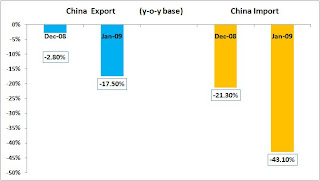China & Russia oil deal
China just made a deal with Russian on $25bn oil purchase for over 20 years. That solves a chunk of China’s long term supply problem.
In return for its $25bn worth of loans, China will get a total of about 2.2bn barrels of oil over 20 years. Including interest at 5%, that equates to a price of $17.40 per barrel over the period, a bargain when the longest NYMEX futures contract, for December 2017, sells at $73.22.
The contract covers about 8% of China’s current oil imports, which are expected to increase sharply in coming years. The Chinese authorities regard long-term oil supplies as a key matter of national security, and are not prepared to rely more than modestly on the international spot market. Hence in recent years, Chinese oil companies have invested in a number of African countries to line up supplies, and have lengthy discussion with the other oil-rich countries.
Given its energy concerns, a 20-year contract with the erratically governed Russia could be regarded as only moderately risky. Russian oil companies may be less likely to default on a deal with China, which takes a strong stance in most international matters, than they would be on an equivalent obligation to the more passive EU, for example.
On the other hand, Russia gets the capital needed to upgrade its oil industry and established a long-term relationship with a large and growing customer. And even the low price of this contract probably represents a profit given Russia’s low extraction costs. It also provides guaranteed demand in the event of an oil glut.
This looks like a win-win deal for both sides.
In return for its $25bn worth of loans, China will get a total of about 2.2bn barrels of oil over 20 years. Including interest at 5%, that equates to a price of $17.40 per barrel over the period, a bargain when the longest NYMEX futures contract, for December 2017, sells at $73.22.
The contract covers about 8% of China’s current oil imports, which are expected to increase sharply in coming years. The Chinese authorities regard long-term oil supplies as a key matter of national security, and are not prepared to rely more than modestly on the international spot market. Hence in recent years, Chinese oil companies have invested in a number of African countries to line up supplies, and have lengthy discussion with the other oil-rich countries.
Given its energy concerns, a 20-year contract with the erratically governed Russia could be regarded as only moderately risky. Russian oil companies may be less likely to default on a deal with China, which takes a strong stance in most international matters, than they would be on an equivalent obligation to the more passive EU, for example.
On the other hand, Russia gets the capital needed to upgrade its oil industry and established a long-term relationship with a large and growing customer. And even the low price of this contract probably represents a profit given Russia’s low extraction costs. It also provides guaranteed demand in the event of an oil glut.
This looks like a win-win deal for both sides.


